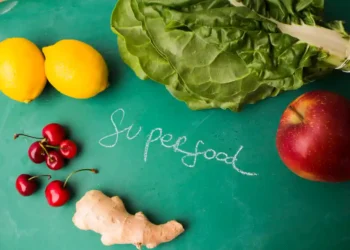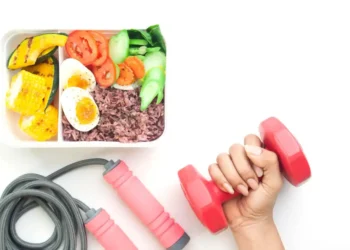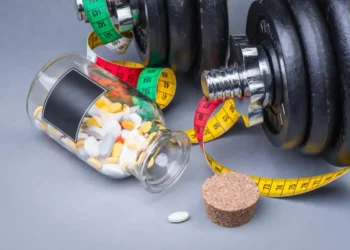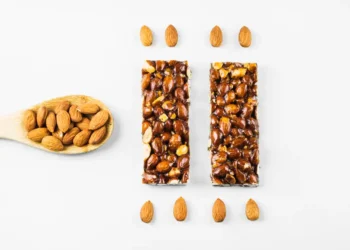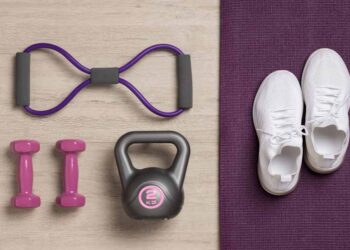Did you know that 97.3% of collegiate track and field throwers know dehydration hampers performance? Yet, 50.5% think thirst tells them when they are dehydrated. There is a big gap in understanding the role of good hydration and diet in sports.
Key Takeaways:
- Proper hydration and nutrition are crucial for optimizing athletic performance and recovery.
- Thirst is not always a reliable indicator of dehydration.
- A balanced diet and adequate fluid intake are essential for nutrient absorption and maintaining optimal hydration levels.
- Pre-workout nutrition and hydration strategies can enhance exercise performance.
- Dehydration can negatively impact exercise performance, leading to early fatigue, reduced coordination, and muscle cramps.
The Importance of Hydration for Athletes
For athletes to do their best, they must stay hydrated. Drinking enough water is key. It helps regulate body temperature, keeps joints moving smoothly, and carries nutrients to cells.
Staying hydrated doesn’t just stop you from feeling thirsty. It also boosts how well you perform. Proper hydration helps avoid problems like lower endurance and fuzzy thinking from lack of water. These issues could slow you down and affect your training.
Remember to drink water before, during, and after your workouts. But, don’t stop there. Athletes should sip fluids all day long. How much water you need depends on your weight, how active you are, and the weather.
Keeping well-hydrated does wonders for your performance. It boosts your energy, keeps your muscles strong, and helps you focus. Keep an eye on how much water you’re drinking to make sure you’re ready to work out or compete.
Every athlete is different. Pay attention to what your body tells you about water. If you’re unsure, talking to someone like a sports nutritionist or a doctor can offer tailored advice. They can help you figure out how to stay at your best through proper hydration.
The Benefits of Hydration:
- Regulates body temperature
- Lubricates joints
- Delivers nutrients to cells
- Improves endurance
- Enhances muscle function
- Boosts cognitive abilities
Optimal Hydration Levels:
Athletes can reach their best by staying hydrated following these points:
- Drink fluids before, during, and after exercise
- Check your urine color and how often you go to the bathroom to see how hydrated you are
- Keep an eye on your thirst, but don’t wait until you’re thirsty to drink
- Eat water-rich foods like fruits and veggies
- Change how much you drink depending on your weight, how much you do, and the weather
By focusing on hydration and understanding the value of good water intake, athletes can do better and meet their sports goals.
The Role of Nutrition in Athletic Performance
Nutrition is key for athletes to perform well. They must eat a range of foods like carbs, proteins, fats, vitamins, and minerals. This diet helps in making energy, fixing muscles, and recovering well. A balanced diet gives athletes the needed energy. And it helps them reach their top fitness levels.
Athletes’ eating is linked to staying hydrated too. The right food helps the body use water better and balance fluids. With a healthy and balanced diet, athletes absorb fluids well. This boosts their hydration and performance.
It’s vital for athletes to eat well every day. They should have fruits, veggies, whole grains, lean meats, and good fats in their meals. Eating at the right times helps the body use these nutrients best during workouts.
“Proper nutrition supports optimal hydration by facilitating nutrient absorption and maintaining fluid balance within the body.”
The Importance of a Balanced Diet
For athletes, a varied diet is crucial for taking in and using nutrients. Carbs give them energy for sports. Proteins help their muscles grow and heal. And fats keep their cells healthy. Vitamins and minerals are also important for energy and health.
Eating a mix of food groups ensures athletes get all they need for peak performance. This means including meats, fish, grains, fruits, veggies, and fats like nuts and avocados.
Drinking enough fluids is crucial for athletes too. They need to sip water all day and during practice to stay at their best.
The Benefits of Healthy Eating Habits
Healthy eating habits make athletes feel good and do well. Choosing nutrient-rich foods over junk food and sugary drinks helps them achieve their goals.
Fruits and veggies are important as they boost recovery and fight stress from exercise. Lean proteins help muscles, and whole grains give lasting energy.
Healthy eating also means watching how much you eat and understanding your body’s needs. Proper food before, during, and after workouts helps athletes perform their best.
Pre-Workout Nutrition and Hydration Strategies
To boost your workout performance, focus on what you eat and drink before. The right nutrients and enough water give you more energy and muscle power. This makes a big difference in how well you perform.
The Importance of Pre-Workout Nutrition
Eating a mix of carbs and proteins 2-3 hours before exercising is crucial. Carbs give you energy, while proteins help your muscles grow and repair.
“A well-balanced meal before a workout can provide the necessary nutrients to optimize performance and recovery,” says Dr. Sarah Johnson, a renowned sports nutritionist.
If you can’t have a full meal, snacks with carbs and proteins are good 30 minutes to an hour before. They still help your body with the energy and muscle support it needs.
Hydration Strategies for Pre-Workout
Getting enough water is just as important as eating right before a workout. Water keeps your body in balance, helps with food nutrients, and keeps you cool during exercise.
Before working out, focus on drinking water or sports drinks. Start at least two hours before and keep drinking during your warm-up.
“Hydration plays a critical role in performance, so it’s important to prioritize fluid intake before your workout,” recommends Dr. Emma Roberts, a sports medicine specialist.
The right amount of water can vary. It depends on you, like your weight, how active you are, and where you are. Always talk to a pro or a sports nutritionist to know the best amount of water for you.
| Pre-Workout Nutrition Tips | Hydration Strategies |
|---|---|
| Consume a balanced meal with carbohydrates and proteins 2-3 hours before exercise. | Drink fluids at least 2 hours before exercise. |
| If a full meal isn’t possible, opt for smaller snacks with carbohydrates and proteins 30 minutes to an hour before exercise. | Continue sipping water or sports drinks during your warm-up. |
| Consult with a healthcare professional or certified sports nutritionist for personalized advice on nutrient timing. | Ensure optimal water intake based on your body weight, activity level, and environmental conditions. |
Use these tips for eating and drinking right before a workout. They help your body do its best. Remember, what works for one person may not work for you. So, pay attention to how your body feels and adjust as needed. Good eating and drinking habits are key to better workouts and reaching your fitness goals.
The Impact of Hydration on Exercise Performance
Staying hydrated is key for top exercise results. Athletes get worse at what they do when they’re thirsty. They feel tired early, become less coordinated, and may get cramps. This all messes with how well they perform.
So, athletes, especially in heat or during tough workouts, should keep drinking. Good choices are water or sports drinks. These keep the body’s fluid and electrolyte levels where they should be. This way, the athlete’s body works better, and they feel healthier.
Drinking enough while working out keeps things balanced inside. It lets the body do its jobs right. Like, keeping the right temperature, moving nutrients and oxygen to muscles, and getting rid of waste well.
“Hydration is an often overlooked but crucial aspect of exercise performance. Athletes should ensure they drink enough fluids before, during, and after exercise to maintain their performance levels and minimize the risk of dehydration-related issues.” – Dr. Kimberly Carter, Sports Nutritionist
The Benefits of Proper Hydration during Exercise
Enhanced Endurance: Drinking well helps fight off tiredness and boosts how long athletes can keep going. It helps them keep their ability up, longer.
Improved Cognitive Function: Being dehydrated makes the brain work worse. This affects focus and quick thinking. Drinking enough helps keep the mind sharp through training and competitions.
Muscle Function and Recovery: Having the right amount of fluids is key for your muscles. It helps them work well, lessens cramps, and sweeps away waste. This leads to a quicker recovery after working out.
Athletes should make a drink plan that fits their needs. Whether it’s how much they’re exercising, how hard, or the weather. Keeping up with fluids helps them perform better, stay healthy, and avoid dehydration problems.
Conclusion
Hydration and nutrition work together to keep us healthy and performing well. Athletes need to focus on what they drink and eat to do better in their sports. They must have a balanced diet and drink enough water. This helps their body use nutrients well and stay hydrated.
Athletes who understand how drinking and eating right can reach their fitness goals. They should eat a mix of healthy foods to get all the nutrients they need. Also, when they eat matters too, especially around training times. This can really boost how they perform.
Athletes should get advice from experts in health and sports nutrition. These professionals can give them a plan that fits their own needs. With this help, athletes can improve their performance, recover faster, and do their best.




